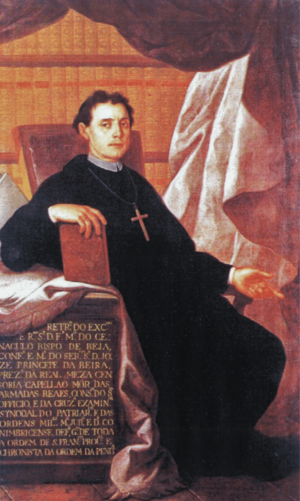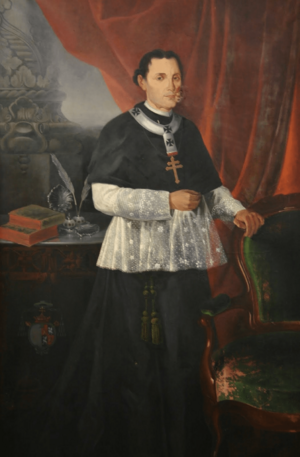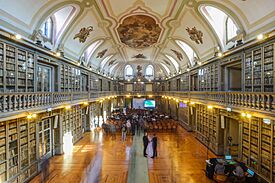Manuel do Cenáculo facts for kids
Quick facts for kids Manuel do Cenáculo |
|
|---|---|
| Archbishop of Évora | |
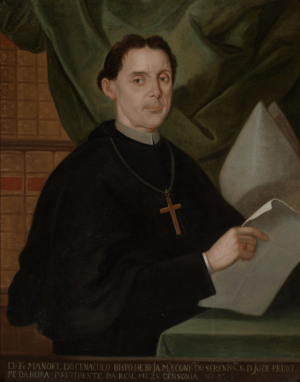
Portrait of Frei Manuel do Cenáculo,
National Library of Portugal |
|
| Church | Roman Catholic Church |
| Diocese | Archdiocese of Évora |
| Appointed | 16 March 1802 |
| Reign ended | 26 January 1814 |
| Other posts | Bishop of Beja (1770–1802) |
| Orders | |
| Ordination | 4 April 1747 |
| Consecration | 28 October 1770 by Francisco de Saldanha da Gama |
| Personal details | |
| Birth name | Manuel de Vilas-Boas Anes de Carvalho |
| Born | 1 March 1724 Lisbon, Portugal |
| Died | 26 January 1814 (aged 89) Évora, Portugal |
| Buried | Church of the Holy Spirit, Évora |
| Alma mater | University of Coimbra |
| Styles of Frei Manuel do Cenáculo |
|
|---|---|
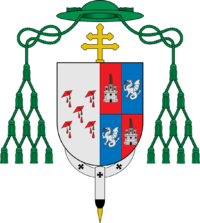 |
|
| Reference style | His Most Reverend Excellency |
| Spoken style | Your Most Reverend Excellency |
| Religious style | Frei Manuel |
Dom Frei Manuel do Cenáculo (born Manuel de Vilas-Boas Anes de Carvalho; March 1, 1724 – January 26, 1814) was an important Portuguese Franciscan leader. He served as the first Bishop of Beja from 1770 to 1802. Later, he became the Archbishop of Évora from 1802 until his death in 1814.
Manuel do Cenáculo was one of Portugal's smartest people during his time. He believed in the new ideas of the Enlightenment. He also supported the reforms of Marquis of Pombal to improve public education in Portugal. He helped change the University of Coimbra and led the Royal Censorship Board. He was the first to suggest creating a national library and collected many books, old objects, and artworks.
After Pombal lost power in 1777, Manuel do Cenáculo focused more on church life. He also helped create public schools, libraries, and academies across the country. Some of his most famous creations include the Évora Public Library, the Library of the Lisbon Academy of Sciences, and the art and history collection that is now the Frei Manuel do Cenáculo National Museum.
Early Life and Education
Manuel de Vilas-Boas Anes de Carvalho was born in Lisbon. His father, José Martins, was a metalsmith from a small village. His mother, Antónia Maria, taught him about religion and good values. His uncle was connected to the Holy Office of the Inquisition. Manuel do Cenáculo was open about his simple background. He once said a scar on his face came from a spark when his father was working with hot iron.
He likely learned to read and write at his local parish church, as this was common for basic education then. At 16, he joined the Third Order of Saint Francis in Lisbon. He studied Humanities (subjects like history and literature) and later earned a doctorate in Theology (the study of religious faith) from the University of Coimbra in 1749. He then taught at the College of the Arts and the University.
In 1750, he traveled to Rome for a big meeting of the Franciscan Order. This trip allowed him to meet many important thinkers and visit libraries and museums. He saw how modern teaching ideas were being used, even by Pope Benedict XIV. This journey greatly influenced his ideas about culture and education. He started to believe strongly in the ideas of the Enlightenment. Around this time, he also learned Syriac and Arabic, adding to his knowledge of Greek.
When he returned to Portugal in 1751, he published a book called Conclusiones de Logicæ ("Conclusions on Logic"). This was an important book for the Franciscans in Portugal. It used modern ideas to teach Logic (the study of reasoning). He also believed that History was important for understanding Philosophy (the study of knowledge and existence).
In 1768, he became the leader (Provincial) of the Third Order of Saint Francis in Portugal. At this time, Portugal was ruled by the Marquis of Pombal. Pombal was a powerful minister who believed the government should control education. He wanted to make science and technology more modern and separate from the church. Pombal saw Manuel do Cenáculo's intelligence and new ideas. He gave him several important jobs related to education and culture. In 1769, he became the teacher and advisor to the king's grandson, Joseph. In 1770, he became the head of the Board of Literary Providence, which worked to reform public education.
Bishop of Beja
In 1770, Pope Clement XIV brought back the old Diocese of Beja. This area had not had a bishop since the 8th century. Manuel do Cenáculo was chosen as the first bishop of this restored diocese in March 1770. He was officially made a bishop on October 28 by Cardinal-Patriarch Francisco de Saldanha da Gama. However, he continued to stay in Lisbon at the royal court.
In 1777, King Joseph I died, and his daughter Queen Maria I became queen. This period was known as "the Turnabout." The Marquis of Pombal and his allies lost their power because Queen Maria I was very religious and did not like Pombal's policies. Manuel do Cenáculo was sent to his bishopric in Beja, where he lived for the next twenty-five years.
As Bishop of Beja, he worked hard to promote culture and education. He often attended meetings and conferences. He started a public course in Humanities and Theology in his own palace. He also helped poor boys from the mountains get an education so they could return to their villages and teach others to read and write. He paid for Latin teachers in small villages. He also supported the training of "Mestras de Meninas" (teachers for girls). This was an important step towards formal education for women in Portugal.
During this time, Manuel do Cenáculo greatly expanded his collection of old objects. He had connections with scholars across Europe. He also found many ancient items during his own archaeological digs in Beja. Because his collection included many large items that couldn't fit in a library, he turned a nearby church into a museum. He named it the Museu Sisenando Cenaculano Pacense.
Archbishop of Évora
In 1802, the government of John, Prince Regent appointed Manuel do Cenáculo as the new Archbishop of Évora. Any past disagreements with Pombal's allies were forgotten. In Évora, he continued his work for public education. He created a public library and museum, making his valuable collection of old objects available for everyone to see.
In 1807, he was in Évora, setting up new courses in church history, Bible studies, and morals. However, these were stopped by the Napoleonic invasion of Portugal during the Peninsular War. In July 1808, the French forces attacked Évora. The city's poorly armed citizens and militias were defeated, and the city was brutally looted. Archbishop Manuel do Cenáculo, who was 85 years old, refused to leave the city.
When French soldiers stormed the Cathedral, shooting a chaplain and throwing grenades, the Archbishop bravely stood up. Even at bayonet point, he calmly surrendered, begging the soldiers to spare his people's lives. After seeing his palace and library looted, Manuel do Cenáculo was arrested and taken to prison in Beja.
After the French invasion ended in August, the Prince Regent ordered that the Archbishop be returned to his diocese with great respect. Manuel do Cenáculo returned to Évora on October 17, 1808. He was welcomed with cheers, ringing bells, and fireworks.
In his last three years, he began to lose his eyesight and physical strength. He died on January 26, 1814. He was buried in the Church of the Holy Spirit in Évora. This church is now part of the University of Évora. His tombstone has a Latin inscription that praises his dedication to religion and his country.
Legacy and Contributions
Manuel do Cenáculo wrote many books and articles on various topics. He wrote in defense of educational reforms and about the history of religious speeches in Portugal. He also wrote about his work in education and archaeology in southern Portugal.
As a bishop and archbishop, he published many pastoral letters (official letters from a bishop to his church members). These letters showed his belief that educated clergy (church leaders) were important for modernizing society and the economy. These ideas were in line with his Enlightenment beliefs.

Manuel do Cenáculo strongly believed that libraries were key to education. He thought that creating libraries was a patriotic duty. He knew a lot about how libraries should be organized. He was closely involved in creating some of Portugal's most important public libraries. He was the first to plan the Royal Public Library of Lisbon, which is now the National Library of Portugal. He also helped create the library at the Convent of Our Lady of Jesus in Lisbon, now the Library of the Lisbon Academy of Sciences. He also founded the Évora Public Library.
Manuel do Cenáculo's important collection of old objects in Évora was damaged during the Napoleonic invasions. However, he had drawings made of all his epigraphic (inscriptions on objects) specimens. These drawings still exist today in the Évora Public Library.
Manuel do Cenáculo had strong connections with many smart people across Europe. His collection of over five thousand letters is kept at the Évora Public Library. These letters show that he wrote to scholars, artists, book lovers, princes, and missionaries from many countries.
 | Isaac Myers |
 | D. Hamilton Jackson |
 | A. Philip Randolph |


